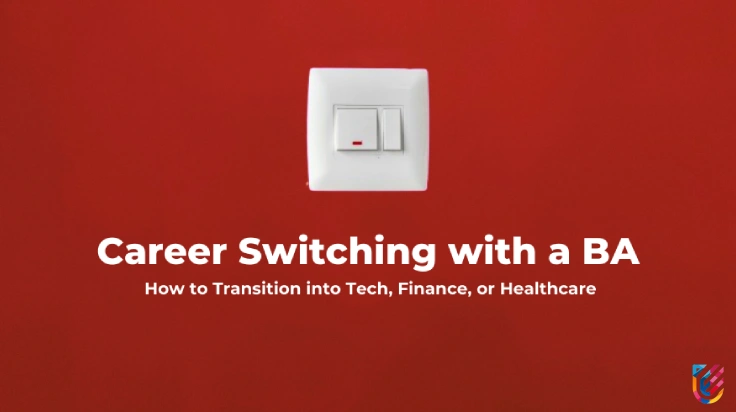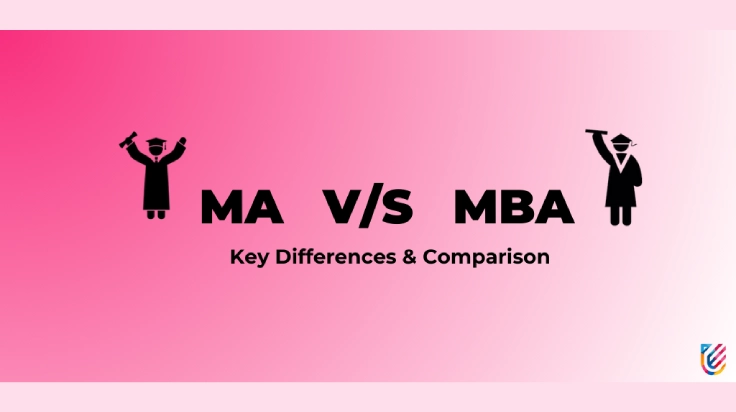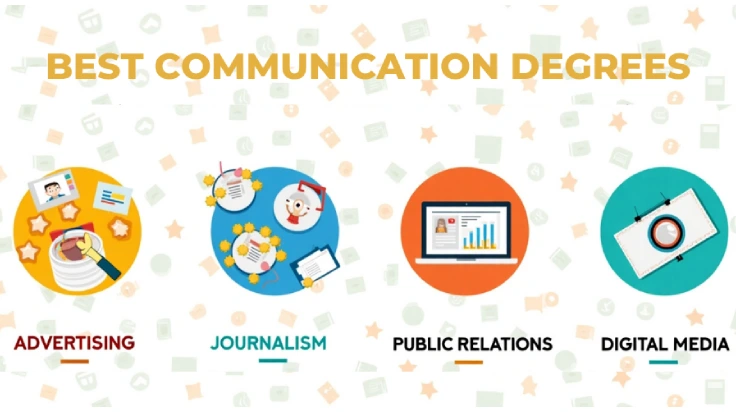Career Switching with a BA: How to Transition into Tech, Finance, or Healthcare
- UPES Editorial Team
- Published 05/03/2025

Table of Contents:
Very often you may feel you’ve chosen the wrong field after pursuing a BA Degree. Jobs after pursuing a BA degree can be less in money or satisfaction, making you feel your skills can be employed better elsewhere. Good news that a Bachelor of Arts (BA) degree equips students with transferable skills like communication, critical thinking, and problem-solving. These skills can serve as a foundation for transitioning into diverse fields like tech, finance, or healthcare. If you’re wondering, “How do I transition my career after my bachelor’s?” this guide will take you through the steps, challenges, and opportunities of making a successful career switch.
Become future-ready with our Liberal Studies programs
Know MoreHow to Transition My Career After My Bachelor’s?
Switching careers after completing a BA might feel daunting, but it’s entirely possible with the right approach. Here’s a step-by-step guide:
- Identify Your Interests: Explore fields that excite you and align with your strengths.
- Acquire Relevant Skills: Enroll in courses, attend workshops, or pursue certifications in your chosen field.
- Gain Experience: Start with internships, volunteer opportunities, or freelance projects to build credibility.
- Network Strategically: Connect with professionals in your target field through LinkedIn or industry events.
- Tailor Your Resume: Highlight transferable skills and any relevant experience you’ve gained.
Transitioning after a BA is a journey that requires planning and persistence, but it can lead to a fulfilling career in a field you’re passionate about.
How to Make a Career Switch into Tech?
Tech may seem like a distant domain for BA graduates, but it’s one of the most accessible industries if approached strategically.
Steps to Transition into Tech:
- Choose a Niche: Identify areas like web development, data analytics, UX design, or digital marketing that align with your interests.
- Learn the Basics: Take beginner-friendly courses on platforms like Coursera, edX, or Codecademy. Popular options include Python, HTML/CSS, or data analysis with Excel.
- Pursue Certifications: Get certified in relevant skills, such as Google Data Analytics, AWS Cloud Practitioner, or UX Design.
- Build a Portfolio: Create projects showcasing your skills, like websites, apps, or data visualizations.
- Apply for Entry-Level Roles: Focus on internships, junior roles, or even remote gigs to gain experience.
UPES School of Advanced Engineering and the School of Computer Science at UPES are pioneers in shaping future-ready professionals with cutting-edge programs and a strong industry focus. These schools blend innovation, practical learning, and academic excellence to equip students with the skills and knowledge needed to excel in technology-driven industries.
Why Choose UPES?
- Industry-Aligned Curriculum: Programs tailored to meet current and future industry demands.
- State-of-the-Art Labs: Modern infrastructure for hands-on learning.
- Expert Faculty: Industry veterans and researchers guiding students.
- Global Collaborations: Partnerships with leading organizations for internships and placements.
Both schools are committed to producing graduates who are not only technically proficient but also innovative problem-solvers, ready to lead in the evolving world of engineering and computer science.
Post-Transition Opportunities in Tech:
- Roles: Data Analyst, Web Developer, Digital Marketer, UX Designer.
- Salary: ₹5-15 LPA (depending on skills and experience).
Switching to tech requires dedication, but with abundant learning resources and a demand for skilled professionals, the path is rewarding.
How to Make a Career Switch into Finance?
The finance industry welcomes individuals with analytical and problem-solving skills—qualities often honed during a BA program.
Steps to Transition into Finance:
- Understand the Basics: Learn core financial concepts like accounting, budgeting, and investment analysis.
- Get Certified: Certifications like CFA (Chartered Financial Analyst), FRM (Financial Risk Manager), or CPA (Certified Public Accountant) add significant value.
- Master Analytical Tools: Learn tools like Excel, Tableau, or Python for financial analysis.
- Seek Relevant Experience: Intern with banks, financial institutions, or investment firms to gain hands-on knowledge.
- Network in the Industry: Attend finance seminars and connect with industry professionals.
Choose UPES School of Business
The School of Business at UPES is a hub for nurturing future business leaders with a blend of academic rigor and industry relevance. It offers specialized programs across key business domains, emphasizing innovation, leadership, and practical learning. With expert faculty, cutting-edge infrastructure, and strong industry connections, the school ensures students are equipped with the skills to excel in the global business environment.
Courses Offered:
- B.Com.(H)
- BBA in Digital Marketing
- BBA in Human Resource Management
- BBA in Financial Analysis
- BBA in International Business
- BBA in Operations Management
- MBA in Oil and Gas Management
- MBA in Logistics and Supply Chain Management
- MBA in Financial Analysis and Services
Through these programs, students gain real-world insights, practical experience, and a strong foundation to thrive in the competitive business landscape.
Post-Transition Opportunities in Finance:
- Roles: Financial Analyst, Investment Banker, Risk Manager, Accountant.
- Salary: ₹6-20 LPA (depending on specialization).
Finance offers immense growth potential and lucrative salaries, making it an excellent choice for BA graduates.
Also Read: Top BA Specializations 2025
How to Make a Career Switch into Healthcare?
Healthcare is a vast industry, and you don’t need to be a doctor to thrive in it. There are numerous non-clinical roles suited for BA graduates.
Steps to Transition into Healthcare:
- Research Non-Clinical Roles: Focus on roles like healthcare management, medical writing, or public health consulting.
- Pursue Certifications: Consider certifications in healthcare management, medical billing, or public health.
- Leverage Your Skills: Communication, organization, and problem-solving skills are highly valued in healthcare roles.
- Gain Experience: Volunteer at hospitals, NGOs, or public health campaigns to gain industry insights.
- Apply for Targeted Roles: Look for roles in healthcare administration, patient advocacy, or medical sales.
Choose UPES School of Health and Technology
The School of Health Sciences and Technology at UPES is dedicated to fostering innovation and excellence in healthcare education. With a curriculum aligned to industry needs, it offers programs that integrate cutting-edge technology with traditional healthcare practices. Students gain practical knowledge through state-of-the-art labs, industry partnerships, and experiential learning opportunities. The school focuses on preparing future-ready professionals in fields such as public health, medical lab technology, and healthcare management, ensuring graduates are equipped to excel in the rapidly evolving healthcare sector.
Post-Transition Opportunities in Healthcare:
- Roles: Healthcare Administrator, Medical Writer, Public Health Consultant, Patient Advocate.
- Salary: ₹5-12 LPA (entry-level roles).
With the global emphasis on healthcare, transitioning into this field offers stability and purpose-driven work.
Which is the Best Career Option After BA Graduation?
The “best” career option depends on your interests, strengths, and goals. However, fields like tech, finance, and healthcare stand out due to their growth potential and diverse opportunities. Tech offers innovation, finance ensures stability, and healthcare provides purpose. Evaluate your priorities before making a decision.
Factors to Choose While Transitioning
When switching careers after a BA, consider these factors:
- Interest Alignment: Choose a field you’re genuinely passionate about.
- Market Demand: Opt for fields with robust job opportunities and growth potential.
- Learning Curve: Assess the time and effort needed to acquire new skills.
- Financial Viability: Consider the cost of certifications and potential earnings.
- Long-Term Goals: Ensure your chosen field aligns with your future aspirations.
Challenges Faced and How to Overcome Them
No one said transitioning would be easy, especially when coming from humanities background. To help prevent any shocks on the way, we have listed some challenges one can expect and possible solutions for them:
Common Challenges:
- Lack of relevant skills or experience.
- Financial constraints for certifications or training.
- Difficulty in gaining credibility in a new field.
Solutions:
- Upskilling: Take advantage of free or affordable online resources.
- Networking: Connect with professionals who can guide and recommend opportunities.
- Start Small: Begin with internships or freelance projects to build your profile.
- Stay Persistent: Career transitions take time; consistency is key.

Our counsellors are just a click away.
Conclusion
Transitioning your career after a BA degree might seem challenging, but with the right strategy and determination, it’s entirely achievable. Whether you’re aiming for tech, finance, or healthcare, focus on acquiring the right skills, networking strategically, and staying committed to your goals.
Ready to take the leap? Begin your journey today and unlock new opportunities in the dynamic worlds of tech, finance, and healthcare!
UPES Editorial Team
Written by the UPES Editorial Team
UPES Admission Enquiry
Subscribe to UPES Blogs
Join our community for exclusive stories, insights, and updates
By clicking the "Subscribe" button, I agree and accept the privacy policy of UPES.






























